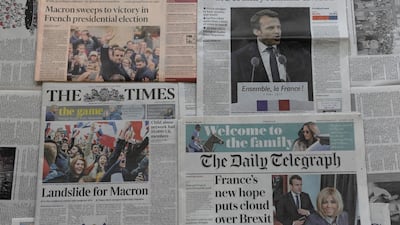In this age of whistleblowers and hacks, leaks and counter-leaks, the day-to-day job of being a journalist has become somewhat akin to a demolition derby, in which good fortune, as much as anything else, keeps reputations, principles and skins intact, if dented and scraped to varying degrees.
The conventional wisdom is that this situation is a direct consequence of the proliferation of social media. However, the truth is that although it is amplified by the instant deluge of judgment that can rain down, monsoon-like, on these platforms − and then, just as quickly, move on − the cause also lies with the failings of the traditional media itself.
As a whole, the English-language media lost its sense of objectivity a long time ago. Over the last 17 years, in particular, there has been a steady erosion of any willingness to hold the middle ground and present a truly diverse range of opinions, with all the discomfort that entails. This phenomenon is endemic, from the Americas to Europe, Africa and Asia.
Many have argued that the collapse of the pre-internet business model – which has, on the one hand, triggered a fragmentation of the media and, on the other, aided consolidation of previously dominant outlets under new types of owners − is the main driver of this trend.
However, another aspect is in play. Even when it was economically robust, the old media order was actually quite weak in moral terms. In much the same way that the Roman Empire could only be conquered from without once it had failed from within, the digital age has merely hastened the collapse of the traditional press.
When the media was most needed as a bulwark of scepticism and objectivity, it instead clung to the coattails of institutions that were, on the surface, sure of how the world should be shaped for the benefit of us all, but were, in reality, fundamentally dedicated to the pursuit of their own interests.
The overwhelming majority of the press got two of the biggest calls of this century wrong. It largely backed the 2003 invasion of Iraq, based on overblown reports of weapons of mass destruction, which served the aims of a dominant neoconservative ideology. It was also taken in by the swaggering confidence (and bulging coffers) of Wall Street investment banks, and refused to listen years earlier to warnings about the risks of the sub-prime mortgage boom in the US.
To an extent, these mistakes were overreactions to an even bigger miss – although it wasn’t just the media that failed here – which was that terrorists and extremists had hidden in plain sight, pursuing their vicious and deadly aims behind laws designed to protect the freedoms of innocent people. The September 11 attacks served to undermine the very foundations of our confidence that we should provide the right to freedom of opinion to all.
So it was that, in the English-speaking world at least, the media abdicated its much-needed responsibility to shape discourse and influence a more tolerant and balanced society. In that vacuum, the steady polarisation of public discourse and political ideology towards the far left and far right has crushed the idea that pluralism should be tolerated, let alone pursued as an ideal for a society.
While extraordinarily widespread access to social media – according to recent figures, around 40 per cent of the word are active users − has altered the landscape of the entire industry, the suspicion lingers that the users on these platforms have picked up where the mainstream media left off. After all, readers and audiences have long bought newspapers and tuned into TV news channels that reflect and amplify their views. Social media has reinforced this reality and, in a wholly unvirtuous circle, the rest of the media has doubled down once again in response.
The consequence is the rise of media controversialists and provocateurs. Take the example of the British columnist Rod Liddle. He was in typically offensive form when he recently suggested, with tongue in cheek, that the radical hate preacher Anjem Choudary should blow himself up in the London borough of Tower Hamlets. I disagree with much of what Liddle says but nevertheless found the vilification he received on social media – much of it from other journalists − for this to be unfair. Even if you do agree with his treatment, isn't there an argument for a more considered response, even if only because anger appears to be precisely what he wants to provoke? We seem to have lost a sense of perspective.
However, there is still plenty of time to find the courage to take responsibility for getting this perspective back. It may have become an unpleasantly pervasive habit, but we are all able to resist the temptation to stomp on any viewpoint that happens to contradict our own. We are also capable of actively creating space for each other’s opinions, in real life and online, and of recognising that the abandonment of open discourse has created an increasingly fractured, unpleasant and dangerous world.
By committing to more – not less – tolerance of those we disagree with, we might not get everything we want but we will reclaim the middle ground, ultimately diminishing the margins in which the real extremists thrive. It will also show our governments that we prefer that diverse and public discourse be treated as a sign of a society’s robustness rather than a threat to be snuffed out.
Mustafa Alrawi is an assistant editor at The National


